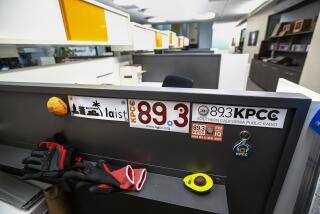KCET in Bid to Buy KOCE
In a move to preserve Orange County’s only public television outlet, KOCE-TV boosters have joined with Los Angeles PBS affiliate KCET-TV to make a combined bid for the financially struggling station.
At the same time, San Diego State University’s KPBS-TV has abandoned its bid, citing the expected cost and a desire to strengthen the hand of the KOCE-TV Foundation against an array of rivals, including televangelist groups.
“We want to make sure that KOCE remains a public television station,” said Doug Myrland, general manager of KPBS-TV Channel 15.
Coast Community College District, which holds the license for KOCE-TV Channel 50, has been trying to sell the station since last year. It sought help from a broker in May, netting 10 bids including the San Diego and Los Angeles PBS stations, the KOCE Foundation and a number of religious broadcasters, such as Trinity Broadcasting Network in Costa Mesa.
It is unclear whether the college board could take action as soon as its Aug. 20 meeting.
An earlier attempt by the KOCE-TV Foundation to buy the station failed over the college’s fears that the group could not afford the $8 million a year it costs to run the station.
Under the merged bid, operating costs would be reduced by an unspecified amount through the consolidation of technical and administrative operations.
“We think this is the best way to preserve it for PBS,” said Bob Brown, president of the KOCE-TV Foundation. “We just felt that the effort was better than either one of us alone.”
Al Jerome, president of KCET-TV Channel 28, said in a statement that a merger could preserve KOCE while marshaling both organizations’ resources “to strengthen the service to Orange County audiences, and build upon their strong base of educational programs.”
Brown declined to discuss specifics of the bid, citing a nondisclosure agreement the bidders signed. But should the Foundation-KCET bid be successful, he said, the stations would merge some functions but preserve independent programming, such as the KOCE’s “Real Orange” public-affairs show.
Brown said that KOCE could eventually produce more local shows, but that such discussions were premature.
Whether the partnership can compete financially against the other bidders remains to be seen. TBN, for instance, has assets exceeding half a billion dollars, compared with $2.7 million for the KOCE-TV Foundation, according to its 2001 federal tax filing. TBN made its bid for KOCE through a subsidiary, Community Educational Television Inc.
Mitch Goldstone, who is mounting an e-mail-based grass-roots effort to pressure the college directors to keep the station a PBS affiliate, said he feared the consolidation of bids still might not be sufficient to preserve KOCE.
“The televangelist outlets have more money than God, if you will, and they can bid up the price so much higher,” Goldstone said. “I’m very concerned that it will go to the highest bidder.”
With the Orange County Register and its owner, Irvine-based Freedom Communications, for sale, KOCE could soon become the only locally owned mainstream media outlet in a county of some 3 million residents.
(The Los Angeles Times is owned by Chicago-based Tribune Co.)
Myrland said KPBS and KCET had talked with the foundation about merging their bids.
“At the end of the day [the foundation] concluded they wanted to partner with KCET,” Myrland said. “We don’t want to stand in the way of the process to keep KOCE as a public television station. I think that’s a strong partnership and we want to support that.”
Coast Community College District, which provides $2 million of KOCE’s $8-million annual operating budget, began seeking buyers last year. Two bidders emerged: the KOCE-TV Foundation and Chapman University in Orange.
Chapman dropped out, citing the cost of campus construction projects, and the district decided to broaden the search.
The process sped up in May when the district, caught in a cash squeeze to meet FCC requirements to convert to digital broadcasting, hired Media Venture Partners of San Francisco to seek bids.
The remaining bidders include Daystar TV of Dallas, which describes itself as the nation’s second-largest Christian broadcaster; Almavision Hispanic Network, a Christian Spanish-language broadcaster; and LeSEA Broadcasting Corp., which is based in South Bend, Ind.
Westminster developer Frank Jao, a former director of the KOCE-TV Foundation; an unidentified private investor represented by the Hunter Wise Financial Group; and a group called the Orange County Public Television Foundation also have filed bids.
More to Read
The complete guide to home viewing
Get Screen Gab for everything about the TV shows and streaming movies everyone’s talking about.
You may occasionally receive promotional content from the Los Angeles Times.






